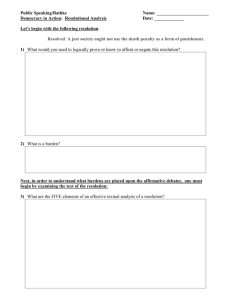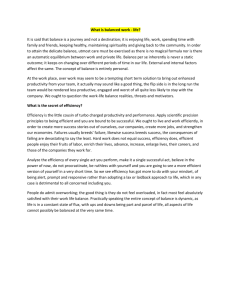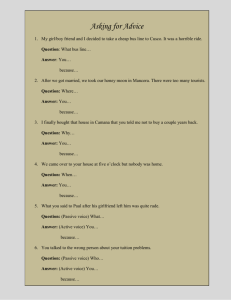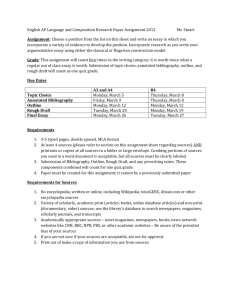Nidoking AC
advertisement
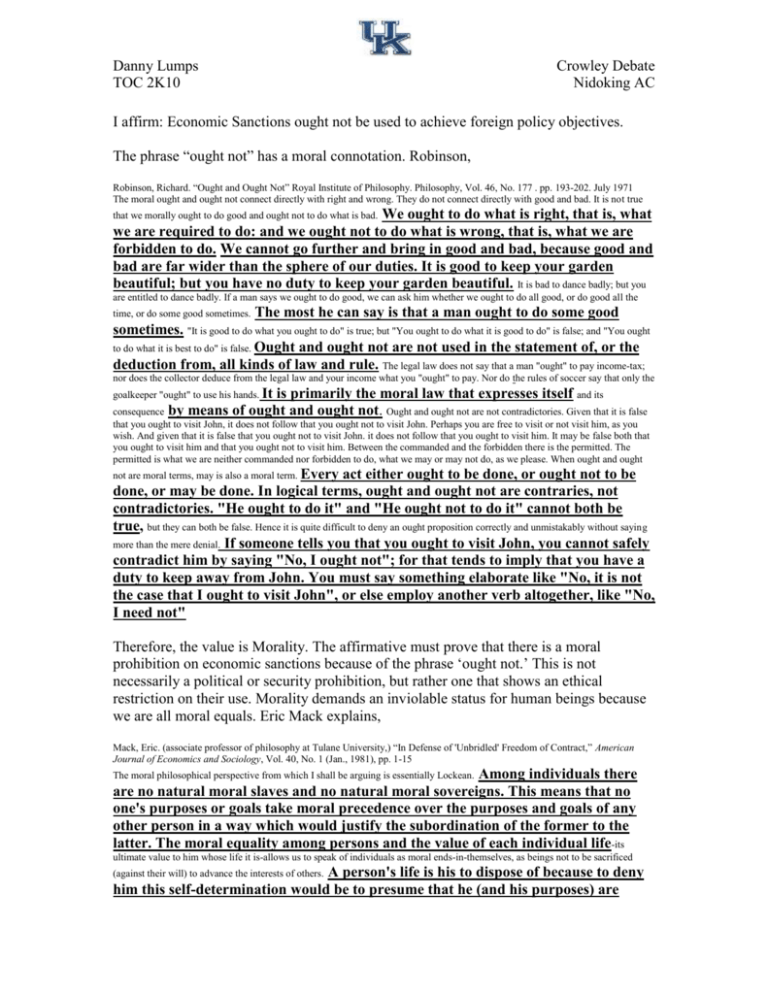
Danny Lumps TOC 2K10 Crowley Debate Nidoking AC I affirm: Economic Sanctions ought not be used to achieve foreign policy objectives. The phrase “ought not” has a moral connotation. Robinson, Robinson, Richard. “Ought and Ought Not” Royal Institute of Philosophy. Philosophy, Vol. 46, No. 177 . pp. 193-202. July 1971 The moral ought and ought not connect directly with right and wrong. They do not connect directly with good and bad. It is not true We ought to do what is right, that is, what we are required to do: and we ought not to do what is wrong, that is, what we are forbidden to do. We cannot go further and bring in good and bad, because good and bad are far wider than the sphere of our duties. It is good to keep your garden beautiful; but you have no duty to keep your garden beautiful. It is bad to dance badly; but you that we morally ought to do good and ought not to do what is bad. are entitled to dance badly. If a man says we ought to do good, we can ask him whether we ought to do all good, or do good all the The most he can say is that a man ought to do some good sometimes. "It is good to do what you ought to do" is true; but "You ought to do what it is good to do" is false; and "You ought to do what it is best to do" is false. Ought and ought not are not used in the statement of, or the deduction from, all kinds of law and rule. The legal law does not say that a man "ought" to pay income-tax; time, or do some good sometimes. nor does the collector deduce from the legal law and your income what you "ought" to pay. Nor do the rules of soccer say that only the goalkeeper "ought" to use his hands. It is primarily the moral law that expresses itself and its consequence by means of ought and ought not. Ought and ought not are not contradictories. Given that it is false that you ought to visit John, it does not follow that you ought not to visit John. Perhaps you are free to visit or not visit him, as you wish. And given that it is false that you ought not to visit John. it does not follow that you ought to visit him. It may be false both that you ought to visit him and that you ought not to visit him. Between the commanded and the forbidden there is the permitted. The permitted is what we are neither commanded nor forbidden to do, what we may or may not do, as we please. When ought and ought not are moral terms, may is also a moral term. Every act either ought to be done, or ought not to be done, or may be done. In logical terms, ought and ought not are contraries, not contradictories. "He ought to do it" and "He ought not to do it" cannot both be true, but they can both be false. Hence it is quite difficult to deny an ought proposition correctly and unmistakably without saying more than the mere denial. If someone tells you that you ought to visit John, you cannot safely contradict him by saying "No, I ought not"; for that tends to imply that you have a duty to keep away from John. You must say something elaborate like "No, it is not the case that I ought to visit John", or else employ another verb altogether, like "No, I need not" Therefore, the value is Morality. The affirmative must prove that there is a moral prohibition on economic sanctions because of the phrase ‘ought not.’ This is not necessarily a political or security prohibition, but rather one that shows an ethical restriction on their use. Morality demands an inviolable status for human beings because we are all moral equals. Eric Mack explains, Mack, Eric. (associate professor of philosophy at Tulane University,) “In Defense of 'Unbridled' Freedom of Contract,” American Journal of Economics and Sociology, Vol. 40, No. 1 (Jan., 1981), pp. 1-15 Among individuals there are no natural moral slaves and no natural moral sovereigns. This means that no one's purposes or goals take moral precedence over the purposes and goals of any other person in a way which would justify the subordination of the former to the latter. The moral equality among persons and the value of each individual life-its The moral philosophical perspective from which I shall be arguing is essentially Lockean. ultimate value to him whose life it is-allows us to speak of individuals as moral ends-in-themselves, as beings not to be sacrificed A person's life is his to dispose of because to deny him this self-determination would be to presume that he (and his purposes) are (against their will) to advance the interests of others. Danny Lumps TOC 2K10 Crowley Debate Nidoking AC naturally subordinate to another and that other's will. To deny him that self-determination would be to treat him as a means to one's own ends, not as a purposive being having ends of his own which are morally on a par with one's own. This does not mean that one has to be im-partial between one's own goals and the goals of another. It means merely that others are not and are not to be treated as means for one's own purposes. Further, this status demands moral constraints on actions. Michael Otsuka summarizes Kamm’s argument, Otsuka, Michael (Professor of Philosophy at University College London,) “Review: Kamm on the Morality of Killing,” Ethics, Vol. 108, No. 1 (Oct., 1997), pp. 197-207 Kamm's own justification of constraints focuses on facts about the status of the potential victims of rights violations rather than facts about the agent who would-violate the constraint. Her view is that constraints are justified because they reflect our elevated moral status as persons who are inviolable insofar as it is impermissible to sacrifice any one of us in order to realize the greater good of minimizing the violation of constraints. Our moral status as inviolable beings is greater than it would have been if it were legitimate to sacrifice any one of us for the sake of minimizing evil. Kamm emphasizes that the impermissibility of violating one person's constraint for the sake of preventing more of the same type of constraint from being violated does not imply the permissibility of the constraint violations that one is not permitted to prevent. Hence, even if we are, statistically speaking, more likely to be killed as a means when there are constraints against minimizing constraint violations, we are, morally speaking, less violable insofar as there are fewer constraints that it is permissible to violate. The implication is that humans are inviolable beings, and an action is deemed immoral if it treats humans as mere means to some ends. In addition, because of our status as inviolable beings, the world is a better place. F. M. Kamm argues, Kamm, F. M. (Littauer Professor of Philosophy and Public Policy, Kennedy School of Government, and Professor of Philosophy, Faculty of Arts and Sciences at Harvard University) “Non-Consequentialism, the Person as an End-in-itself, and the Significance of Status,” Philosophy and Public Affairs, Vol. 21, No. 4 (Autumn, 1992), pp. 354-389 If we are inviolable in a certain way, we are more important creatures than violable ones; such a higher status is itself a benefit to us. Indeed, we are creatures whose interests as recipients of such ordinary benefits as welfare are more worth serving. The world is, in a sense, a better place, as it has more important creatures in it. In this sense the inviolable status (against being harmed in a certain way) of any potential victim can be taken to be an agent-neutral value. This is a non-consequential value. It does not follow (causally or noncausally) upon any act, but is already present in the status that persons have. Ensuring it provides the background against which we may then seek their welfare or pursue other values. It is not our duty to bring about the agent-neutral value, but only to respect the constraints that express its presence. And, determining the direct consequences of actions is impossible, and leads to immoral policy options. Callahan 1, Callahan, PhD. Director, International Program, Senior Fellow at the Harvard Medical School. 1973. The Tyranny of Survival. the dangers of too simple an application of consequentialsim are well known. Once the ends justify the means, the dangers of slipping into a morality of convenience greatly increase. To calculate all the consequences of one’s actions is impossible, and when the calculations are fuzzy, abuse is likely. The utilitarian who On the other hand, Danny Lumps TOC 2K10 Crowley Debate Nidoking AC tries to judge each act without the benefit of rules may find the task impossible to accomplish except with a shallowness that makes a travesty of moral judgment. And given human proclivities to weigh choices in our own favor and the difficulties of being sure of consequences of complex activities, impartiality may be easily lost in the absence of rules. Moreover, when it becomes known that integrity plays no role and you will always choose the lesser of evils as between immediate consequences, you open yourself to blackmail by those who play dirty games. In terms of our Central American example, hw do you know that the officer will keep his word and release the other man? Do you really want the local army to believe that it can successfully entrap visitors into doing their dirty work? When it becomes known that people will always choose the lesser evil in any situation, a “Gresham’s law” of bad moral choices may drive out the prospect of good ones. Once you allow departure from rules and integrity, are you not on a slippery slope to rationalizing anything? Thus, humans are inviolable beings and ought not be used as a mere means to some end. The standard is Respecting the Inviolable Status of People. Simply, this means that humans ought to be treated as ends in themselves, not as a mere means to some ends. My thesis and sole contention argue that sanctions disrespect the inviolability of humans by treating groups of people as means to a foreign policy objective. This is because the objective of economic sanctions is to inflict human rights violations in hopes that it will achieve change. The victims in the target nation see absolutely no benefits from the sanctions. Rarick and Duchatelet write, Rarick, Charles A. (Professor of International Business in the School of Management at Purdue University-Calumet, Indiana, USA) and Martine Duchatelet (Dean of the School of Management and Professor of Finance and Economics at Purdue University-Calumet, Indiana, USA), “An Ethical Assessment of the Use of Economic Sanctions as a Tool of Foreign Policy.” IEA Economic Affiars, June 2008. Sanctions are a means to an end. The theory operating behind sanctions is to cause as much pain as possible to the people of the receiving country in order for pressure to be brought on the government. The citizens of the sanctioned country are used as a means to achieve the foreign policy objectives of the sanctioning country. This is an inherent problem with all sanctions, since they definitionally include a deliberate violation of innocents’ rights. In addition, taking away basic rights of innocents is the goal of economic sanctions. Adam Winkler gives initial examples while explaining why the egregious impacts are the goal of sanctions. He writes, Winkler, Adam (holds a B.S.F.S. from Georgetown University's School of Foreign Service and a J.D. from New York University School of Law) “Just Sanctions” The Johns Hopkins University Press. Human Rights Quarterly 21.1 (1999) 133-155 Such effects from sanctions are predictable. Similar to the Iraqi situation, the embargo against Haiti also had a profound impact on ordinary citizens. According to official US estimates, 240,000 manufacturing and associated industry jobs were lost in 1991 due to sanctions imposed by the Organization of American States. Likewise, an analysis of the sanctions against Serbia-Montenegro reported in the British Journal of Medicine details the devastating impact of sanctions on the health care of ordinary Serbs. Indeed, this is the very premise of sanctions: to inflict such harm upon the economy, and consequently on the target population, that leaders will be forced to alter undesirable policies. Nevertheless, it may be that some of these numbers are exaggerated. However, even if, for example, only one percent of the estimated 500,000 Iraqi children died due to sanctions, moral consideration of this Danny Lumps TOC 2K10 Crowley Debate Nidoking AC deadly instrument of foreign policy is warranted. In this task, the principles underlying the laws of just war provide a place to begin. Further, the citizens of the targeted nation do not consent to their fate. Not only do they not directly agree to the sanctions, but they do not tacitly accept the measures. Joy Gordon 2 explains, Gordon, Joy (Associate Professor in the Philosophy Department at Fairfield University. Her work focuses on human rights and economic rights), “A Peaceful, Silent, Deadly Remedy: The Ethics of Economic Sanctions”, Ethics & International Affairs 13, 1999. Damrosch frames the question of imputed consent as: "Do we assume that people of the target state are innocent and passive bystanders, victims of their own rules and of sanctions? Or that they have the capacity to exercise free choice?" The question seems to all persons have free will and are therefore accountable for their choices. But we know from the history of sanctions that this is not a realistic depiction of a nation under sanctions. Under sanctions, [1] state control over the media is likely to increase, while nonstate parties have less access to equipment and materials needed to disseminate information. As families are forced to go to the black market for necessities, their savings are eroded and their energies are directed primarily toward meeting their immediate needs. [2] The economic hardship to the middle class and the poor means that they will not have enough resources to consider emigrating. [3]Even in a democratic society, the civilian population has no direct input into particular military and political decisions; and in an authoritarian society, this is even more true. Thus, the answer to Damrosch's question is no, we should not assume that the civilian population freely chooses the decisions made by the military and political leaders; it may not have even freely chosen the leaders themselves. Neither should we assume that it freely chooses to stay, given the burden and cost of emigration. It is not even clear that we can say that a population freely chooses to support national military and political decisions, in a context of limited and invite the response that, of course, distorted information and enormous social and political pressure. Even smart sanctions treat people as mere means, because governments must shift their spending away from the public to fit their needs. Daniel Drenzer writes, Drenzer, Daniel W. (Dept of Political Science, University of Chicago) “Review: How Smart Are Smart Sanctions?” Blackwell Publishing on behalf of The International Studies Association 2009 pp 1-5 even if the implementers of smart sanctions become more sophisticated, smart sanctions are still likely to be a noble failure. The contributors to Smart Sanctions acknowledge some of the reasons for this, but not all. For example, the case studies show that smart sanctions still impose significant costs on a target state's populace. Michael Brzoska notes that an arms embargo increases the costs of weapons procurement, leading "to a major shift in government spending priorities and a consequent reduction in the economic well-being of the general population in the targeted state" (p. 126). De Vries acknowledges that "financial sanctions probably caused the greatest negative impact on non-targeted sectors of Serbian society," with the sanctions triggering severe stagflation in the Yugoslav economy (p. 102). The flight ban also imposed greater costs on the Yugoslav opposition than on the Milosevic regime, leading the European Union to reverse course. Moreover, travel sanctions can disrupt the shipment of food and cold-storage medicine to war-torn societies. In short, all sanctions impose costs on innocents. Unfortunately, Danny Lumps TOC 2K10 Crowley Debate Nidoking AC Therefore, unintended harms also occur as a result of targeted economic sanctions. Because sanctions treat people as means to an end, I affirm.
